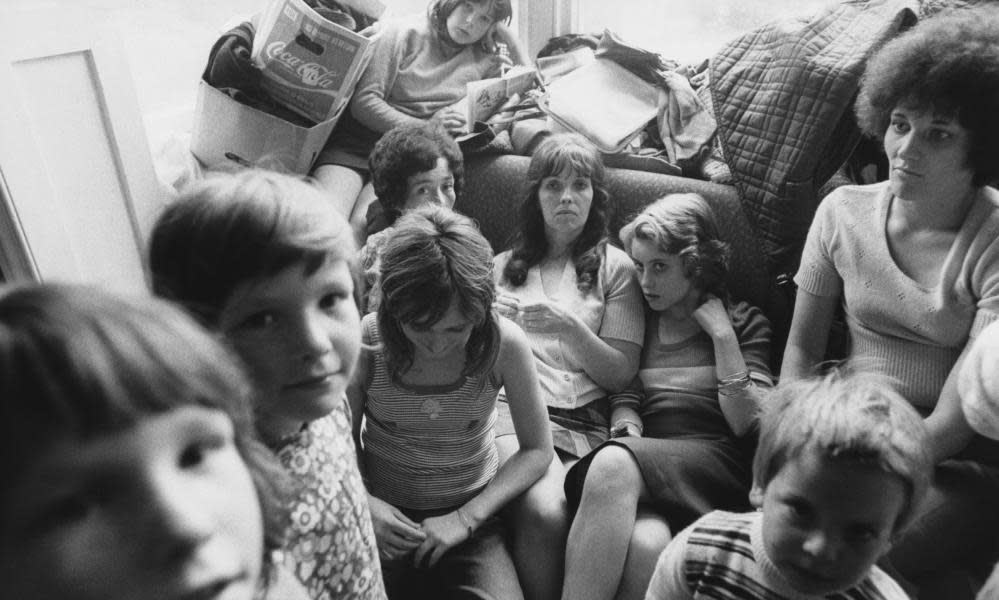'It's not cancer or kittens': the 50-year fight to fund women's refuges

Since the 1970s, women’s refuges – safe spaces for women fleeing domestic abuse – have played a major role in the struggle for gender equality in the UK.
Run locally, with precarious, hard-fought funding, refuges have been vital in protecting women and children from violence and in getting councils, public services and society more widely to take domestic abuse seriously. It is shocking that two women a week are killed by their partners, but there is greater protection now than in the 1970s. Since 2015, coercive and controlling behaviour has been a criminal offence and on Monday, the government’s draft domestic abuse bill introduced further measures to tackle an issue that costs an estimated £66bn a year.
But there’s another aspect of refuges in danger of being lost as cuts to public services bite deep. They were in the forefront of a different way of providing services. Today, in the face of rising demand, panicked public officials talk about local residents being empowered to take more responsibility for their own health and wellbeing: exactly what women’s refuges did from the start.
The founders of women’s refuges were survivors, like the women they supported. They had to campaign hard for money, points out June Freeman, a trustee of the Colchester and Tendring women’s refuge for 40 years. “People were sympathetic to the idea that domestic violence was a bad thing, but it wasn’t an attractive cause to give money to,” she says. “It wasn’t cancer, it wasn’t kittens. It was very hard to find the money and to get public support.”
Refuges were also part of a radical new approach to services in the 1970s, says Freeman. “New attitudes to dealing with alcoholism, domestic violence and homelessness developed, in an attempt to get rid of patronising, condescending attitudes that had been with us since the Victorian era. The most important thing was to ask a woman who came into a refuge what she needed and how we could help.”
Women were so touched, because we were the first people who listened to them and believed them
Refuges have, inevitably, moved on from those early days. They have grown bigger and more organised, with huge specialist expertise on supporting women and their children. But they now face the same, frustrating challenge as so many other UK public services: how to survive as councils slash their funding and other support services disappear. The government’s relentless attack on benefits and a lack of affordable housing have made it harder than ever to support women into secure, independent lives.
“There’s a real crisis,” says Alison Inman, who stepped down in November 2018 as president of the Chartered Institute of Housing after a year of working on domestic abuse. Inman acknowledges that refuges are not always easy to work with, but are “amazing organisations that are local, women-led and survivor-influenced.”
It’s not just cuts that have impacted refuges. Since the 1980s, and the start of full-scale outsourcing of public services, councils have been forced to focus on a very narrow definition of value for money that, in practice, means accepting the lowest bid. This has made it harder for small local organisations, including refuges, but many other charities, too, to bid for contracts from councils. Since 2010, funding for refuges in England, Wales and Scotland has been cut by almost £7m.
Women’s refuges that provide specialist care, especially those working with black and minority ethnic (BME) women and survivors with complex needs, face a particularly high risk of closure. According to Women’s Aid, 17% of specialist women’s refuges were forced to close between 2010 and 2014. Baljit Banga, director of the London Black Women’s Project, says the number is rising all the time. “We are worried, as a sector,” she says.
BME women’s refuges have not fared well in an open market, despite their huge value to the survivors they support, and they are now at great risk – particularly those working with south Asian women and girls. “It can lead to moving women and children on before they are ready,” says Banga. There is even a risk they could return to the perpetrator.
With funding from the Heritage Lottery Fund, Freeman and Banga have organised exhibitions, plus a permanent archive at the University of Essex to preserve vital knowledge about the early days of refuges in the UK. For Freeman, one lesson stands out: the need to “keep at it”, to keep finding funding, to ensure women themselves have a voice about everything that affects their lives as they and their children deal with domestic abuse.
Freeman says refuges have always had to fight for funding and for space to do things differently. At their heart lies a really important attitude to individual women that remains in place. “The very first thing you did, you listened to their stories,” she says. “Women were so touched, because we were the first people who listened to them and believed them.”

 Yahoo News
Yahoo News 
